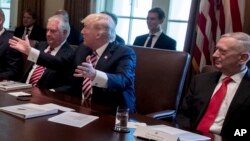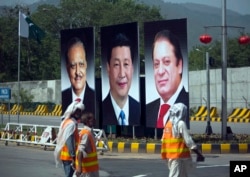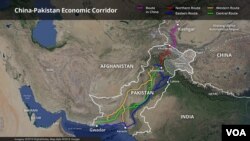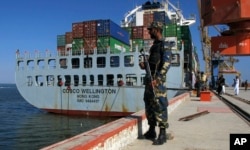Days after the Pentagon announced it is withholding $50 million intended for Pakistan as part of its Coalition Support Fund, the South Asian country’s ambassador told an audience in Washington that Pakistan remains determined to fight terrorism.
“All that Pakistan has done in the fight against terrorism has not been sufficiently factored” into Pentagon’s decision, Ambassador Aizaz Ahmad Chaudhry lamented during a discussion at the Washington office of the London-based International Institute for Strategic Studies.
Chaudhry said Pakistan considers it is in its own interest to fight terrorism, and it stands “ready to work with the United States.”
Air rights up for negotiation?
Pakistan has facilitated air and ground logistical support for U.S. troops in Afghanistan “like no one” else, Chaudhry said, adding that “since 2001, all air corridors from Pakistan have been available to the United States free of cost.”
The reason Pakistan did so “was because we believed this was a common war," the ambassador said, but there have been occasions when U.S. actions have left his country's leaders thinking "that perhaps we are not partners.”
Chaudhry argued that the Coalition Support Funds money that was cut off should be seen as a reimbursement of services, not as aid. Asked during the IISS discussion whether Pakistan would insist on a full payment of the funding before providing U.S. troops with air and ground supply routes, he said, “These and all other issues are always negotiated, because that is in the nature of the business.”
Speaking to VOA after the forum, the ambassador said: “Pakistan has cooperated with the United States in its mission in Afghanistan, we will continue to do so, but all these things are talked [about] by the concerned people at the table.”
Pakistan may not be the only party to question the other’s sincerity. Questions concerning Islamabad’s commitment to the bilateral partnership have also been raised by the U.S. A prime example was the discovery in 2011 that al-Qaida leader Osama Bin Laden had been living undisturbed near a key Pakistani military facility.
U.S. Secretary of Defense James Mattis said he withheld $50 million in Coalition Support Funds because he couldn’t certify to Congress that Pakistan had taken sufficient action against the Haqqani network, a Taliban-associated organization which the U.S. has deemed a Foreign Terrorist Organization, since September 2012. The group has been blamed for attacks in Afghanistan, which have contributed to the country’s destabilization, an issue of concern to the U.S.
For its part, Islamabad’s message is don’t drop “every security lapse in Afghanistan on Pakistan’s doorsteps,” as the country’s ambassador to the U.S. put it.
The Pakistani envoy’s remarks came at a time when U.S. President Donald Trump's administration has been reviewing its overall strategy toward South Asia, including India, Pakistan, Afghanistan and Iran.
US-Pakistan vs. China-Pakistan
Chaudhry contrasted the U.S.-Pakistan friction with his country’s relations with China, which has been investing heavily in Pakistan as part of its One Belt-One Road initiative.
Pakistan and China “have so much of meeting of minds” and no “policy differences at all,” he told VOA. "We support each other's causes. Chinese people respect us, and we respect them."
In a subsequent statement to VOA, the Pakistani Embassy in Washington again stressed the need for respect.
“Pakistan looks forward to working with the United States in achieving enduring peace and prosperity in the region as a shared interest and on the basis of mutual respect,” it said.
The statement also highlighted Chaudhry’s remarks at the IISS forum about Pakistan’s sacrifices in the war against terror.
It urged Washington to develop “an accurate appreciation of Pakistan’s actions against terrorism and its cooperation with [the] international community” which included Pakistan’s “past and ongoing successful counter terrorism operations” as well as “a staggering human and financial cost that the people of Pakistan have paid.”
In his interview with VOA, Chaudhry said he remained “very optimistic” about bilateral ties with the United States and sees points of convergence between the two countries increasing. “There is every reason for us to continue to work together,” he said.
In discussing Pakistan-China relations, Chaudhry told VOA “the clearest example and manifestation” of Sino-Pakistan ties has come in the form of the China-Pakistan Economic Corridor, or CPEC, stretching 3,000 kilometers from Kashgar in western China’s Xinjiang region to the Pakistani port city of Gwadar on the Arabian Sea.
Pakistan's strategic value to China
Due to the strategic importance China attaches to Gwadar and its financial resources, Beijing agreed to build the port for free. China has publicly justified its investment in Gwadar as an alternate route for oil and other commodities headed for the Chinese mainland, but the port’s potential for military uses has even more significance for strategic thinkers.
Earlier this year, Pakistan announced it has leased operation rights for Gwadar to a Chinese company for 40 years.
Details of the lease are not fully public. Andrew Small, a senior fellow at the German Marshall Fund of the United States (GMF), said the formal terms are understood to be purely economic in nature. However, “that doesn’t preclude its being developed for military purposes further down the line, and both sides certainly have that in mind,” he added.
Small is author of The China-Pakistan Axis: Asia's New Geopolitics.
Could China extend Pakistan partnership model?
What appears to be China’s determination to make the Sino-Pakistan partnership a success story, analysts say, may have to do with Beijing’s global ambitions.
“As its need grows for friends who can facilitate the extension of its reach as a global military power,” China is now trying to turn its relationship with Pakistan into a model for other potential security partnerships, Small said.
The question before the United States as it debates its future approach toward Pakistan, in the context of its overall South Asian strategy review, Small said, “is still whether a coherent long-term framework for the relationship can be established, rather than continuing to be dependent on cycles of near-term goals.”
“For various reasons, Pakistan still values a good relationship with Washington,” the analyst said. Among reasons may be what Islamabad perceives as a measure of international prestige gained from its association with Washington.
Rising above the past
The challenge for Pakistan today, analysts said, is whether the country can seize its current opportunities and rise above a past laden with border disputes and domestic instability, so it potentially can be seen as “an emerging market, even a future rising power,” in Small’s words.
“Over time, Pakistan would be better off charting its own course toward better relations with its neighbors, and lessening its dependence on both the United States and China,” said Ambassador Robin Raphel, a former assistant secretary of state for South Asia.
For now, however, Pakistan's Ambassador Chaudhry told VOA: “Both the United States and China have a global role to play, and Pakistan is a friend of both.”
In his view, the ultimate consideration for Pakistan's cooperation with China on Gwadar and CPEC, their economic corridor, comes down to the question of “economic empowerment of the people living in Balochistan and the rest of Pakistan.” The southwestern province of Balochistan, which the economic corridor traverses, also is known as a center of Taliban activity in Pakistan.
Changes have been made to this story to correct inaccuracies introduced during editing and better reflect the tone of Ambassador Chaudhry’s remarks.








